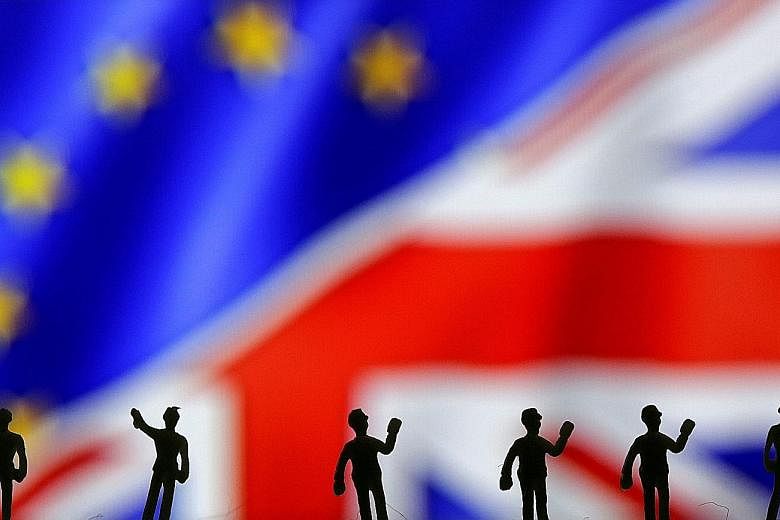LONDON • As polling stations close later tonight in Britain's European Union referendum, one group of businessmen will be watching the results with particular anxiety: the country's opinion pollsters.
For the people whose job it is to measure the prevailing public opinion and predict electoral results have spectacularly failed to deliver on either of these during a number of recent electoral contests. Pollsters will hope to do better tonight, but are also bracing themselves for fresh criticism.
Projecting electoral outcomes is not a very profitable business for polling companies: demand comes in fits and starts, and the only paying customers are political parties, newspapers or broadcasting networks, all of whom have increasingly less cash to spare.
But predicting elections earns opinion polling firms a great deal of publicity and brand recognition, and helps them develop the business which earns most of their money - that of helping commercial firms in understanding how they interact with their customers. And a failure to predict an electoral result hurts the reputation of opinion pollsters badly, precisely because it's so public.
Yet failure has been the opinion pollsters' recent fate. All of them missed the outcome of last year's British general election, predicting that no party would win big, only to be confronted with a decisive victory for Britain's Conservative Party. And in general elections in places as disparate as Canada, Turkey or Israel, pollsters also ended up with egg on their faces.

Theoretically, it should be easier to predict tonight's British results. There are no complicated parliamentary constituencies, and no variables: Britons are simply asked to say "yes" or "no" to their country's continued membership in the EU, a straightforward choice pollsters should be able to predict.
But pollsters still seem to be grappling with the problem of creating the Internet panels and telephone calling lists they use to test public opinion. These "representative samples" need to reflect as closely as possible the voters' gender, age, occupation, earning power, previous voting preferences and many other peculiarities. Yet in an age of lower political engagement and more fluid political loyalties, putting together such samples is difficult.
An industrywide inquiry into why pollsters failed to predict the results of last year's British general election concluded that the chief culprit was faulty sampling. The pollsters have promised to tweak their samples, but only by the end of the decade.

Sir Lynton Crosby, the political strategist who engineered British Prime Minister David Cameron's re-election last year, claims that this sampling uncertainty makes most predictions about tonight's verdict useless. "We don't know really what the polls are showing, to the extent we don't know how well they are measuring things," he recently told journalists in his native Australia.
Nor does anyone seem to be able to explain a persistent discrepancy between British opinion polls conducted over the telephone, and surveys done online.
-
Result still anyone's guess
-
Opinion polls published earlier this week have mostly shown a shift towards keeping Britain in the European Union, but the race still looks too close to call.
ORB/DAILY TELEGRAPH - "IN" AHEAD BY 7 POINTS
An ORB telephone poll of 800 people for the Daily Telegraph, published late on Monday, put support for "In" at 53 per cent, with "Out" at 46 per cent.
The previous poll by ORB, published a week earlier, had put the "Out" camp ahead by only one point.
YOUGOV/THE TIMES - "OUT" AHEAD BY 2 POINTS
A YouGov online poll for the Times newspaper, also published late on Monday, gave "Out" a 44 per cent versus 42 per cent lead over "In".
The survey interviewed 1,652 people between last Friday and Sunday.
YouGov's previous poll had put "In" one point ahead when it was published in The Sunday Times.
REUTERS
According to phone polls, those who wish Britain to remain in the EU have been in a majority throughout the referendum campaign, sometimes by more than 10 percentage points. But pollsters who conducted their sampling online have often reported a lead for Brexit, as the camp of those who wish Britain to leave the EU are known.
Mr Stephan Shakespeare, who runs YouGov, one of Britain's chief pollsters, believes the discrepancy may be due to the fact that people contacted through the phone were only asked whether they support or reject EU membership, so those who were undecided were forced to choose one option, and they opted for the status quo, which is Britain's continued EU membership.
By contrast, online polls provide respondents with various options, and that may reduce the total of EU supporters. There is also the "possibility that the different methodologies reach slightly different types of people", Mr Shakespeare admits.
And then, there is the biggest imponderable of all: turnout. All opinion pollsters make certain assumptions about who is likely to turn out and vote. Yet turnout figures vary widely in Britain, from a mere 42 per cent in the last nationwide referendum on electoral reform in 2011, to 66 per cent in last year's general election and a whopping 84 per cent in the Scottish independence referendum in 2014. The higher the turnout, the higher the chances for Britain staying in the EU, because EU supporters tend to be younger, and younger people also tend not to vote regularly.
Regardless of the outcome tonight, opinion pollsters will find some arguments to explain potential errors. Last-minute "swings" or "shy voters" who refused to disclose how they would vote are two preferred explanations pollsters give when they are found to be wrong.
Still, pollsters know that tonight's outcome in Britain will also be a verdict on their profession. But all they can do now is wait, hoping for redemption.

